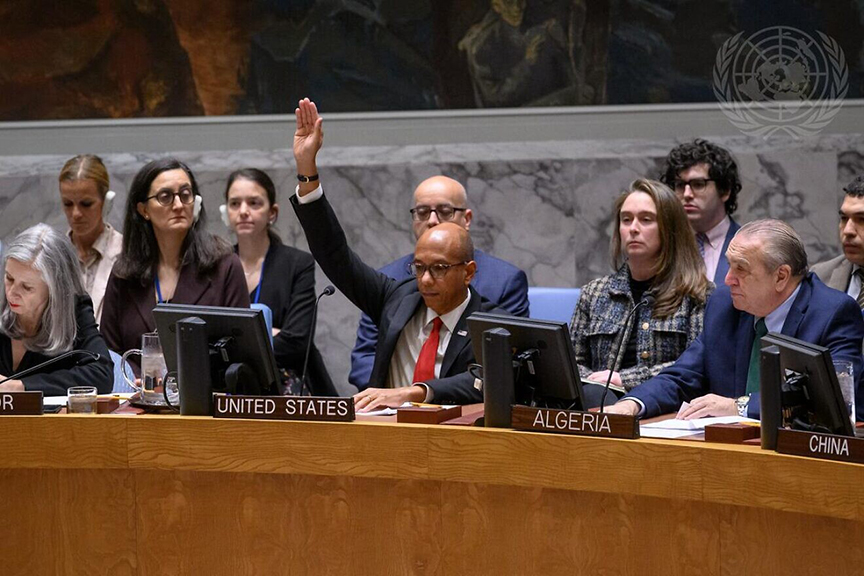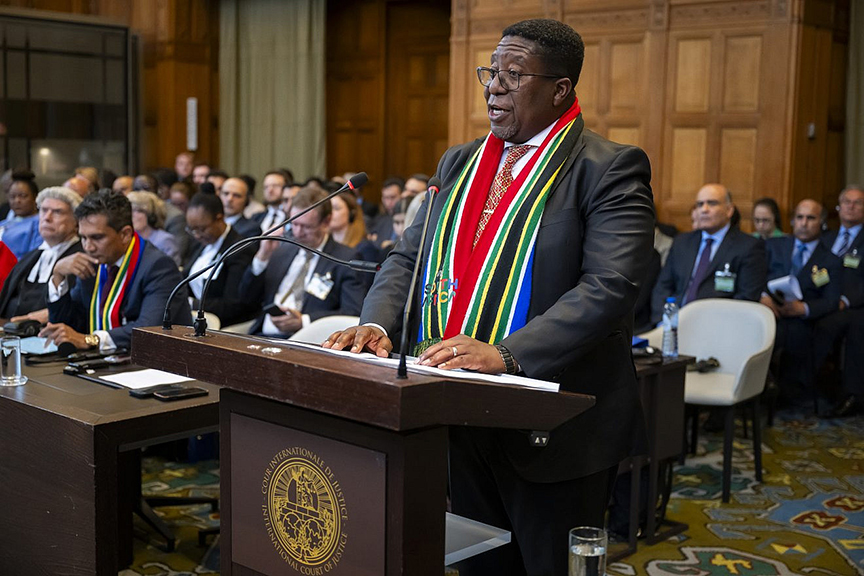U.S. vetoes UNSC ceasefire resolution that doesn’t require release of hostages

Robert Wood, deputy permanent U.S. representative to the United Nations, votes against a U.N. Security Council resolution on the Middle East, Nov. 20, 2024. Credit: Loey Felipe/U.N. Photo.
by Mike Wagenheim
(JNS) — The United States vetoed a U.N. Nations Security Council resolution calling for an Israel-Hamas ceasefire, citing its failure to condition a halt in hostilities directly to the release of the hostages, whom Hamas continues to hold in the Gaza Strip.
“We could not support an unconditional ceasefire that failed to release the hostages,” Robert Wood, deputy U.S. ambassador to the United Nations, told the council on Nov. 20.
Wood accused Hamas — and not Israel — of blocking a negotiated ceasefire and cited Israel’s reference for a temporary ceasefire and a phased release of hostages.
Washington cast the lone vote against the measure among the 15-member body. It is one of five permanent members of the council that has veto power.
The E10, a group of the council’s 10 elected members, put the resolution forward at Algeria’s urging. The North African country is the Security Council’s de facto representative for the Palestinians and the Arab and Muslim world.
Amar Bendjama, Algeria’s envoy to the global body, called it a “sad day” for the council and claimed that the Jewish state has “impunity in this chamber.”
The vetoed resolution demanded an immediate, unconditional and permanent ceasefire, as well as the immediate and unconditional release of all hostages who remain in Gaza.
It rejected “any effort to starve Palestinians” and demanded immediate access to basic services and humanitarian assistance for civilians in Gaza. It also called for aid to enter the Strip at scale and be delivered, including to “civilians in besieged north Gaza.”
Wednesday marked the 12th time that the Security Council has voted on a resolution about the Israel-Hamas war. Only four have been adopted. None of the prior 11 appears to have had a substantive effect on halting hostilities or securing the release of hostages or delivery of aid.
Danny Danon, Israel’s ambassador to the United Nations, told reporters ahead of the vote that the resolution “is nothing short of a betrayal.”
“It betrays the 101 innocent hostages still held by Hamas, their grieving families and the very principles the United Nations claims to defend,” he told journalists.
It is “not a resolution for peace. It is a resolution for appeasement” that abandons the hostages and validates and rewards terrorism, he added.
Softened language
The latest resolution was negotiated extensively and underwent multiple drafts. The first iteration demanded an immediate, unconditional and permanent ceasefire but only insisted upon immediate, unconditional release of all hostages in the next paragraph.
The United States and Japan, among others, requested a revised draft repeatedly, and the next version placed the two demands in the same paragraph. (That followed the agreed-upon text from a prior resolution in March, upon which Washington controversially abstained, allowing it to pass.)
This time around, the Biden administration insisted on an explicit conditional link between the demands for ceasefire and hostage release. This was the formula that was articulated in a June resolution, which called for a phased ceasefire and hostage release scheme. That resolution passed with a Russian abstention.
The E10 rejected the demand, leading to a stalemate — and the U.S. veto.
Washington won other concessions on the text of the resolution, including a critical deletion of language relevant to Chapter VII of the U.N. Charter. The original text of the resolution determined “that the situation in the Gaza Strip and the regional escalation constitute a threat to international peace and security.”
That specific language triggers Chapter VII, which empowers the Security Council to take collective action it deems fit, up to and including the use of force. The Biden administration insisted that it be removed.
The new draft also softened language about implementing the International Court of Justice’s ruling on provisional measures that it said Israel must take in Gaza and on text rejecting actions that undermine the mandate of the U.N. Relief and Works Agency for Palestine Refugees in the Near East, which Israel has said has many employees that are part of Palestinian terror groups and that participated directly in the Oct. 7 attacks.
Despite U.S. pressure, the resolution did not condemn Hamas explicitly, nor did it establish a standing mechanism to review Israel’s allegations about UNRWA.
Matthew Miller, the U.S. State Department spokesman, told reporters during the department’s press conference on Nov. 20 that “we worked in good faith for several weeks to try to get to ‘yes’ on this resolution, to try to get to a resolution that we can vote for.”
“As you know, we have voted for a resolution in the Security Council resolution already this year that called for a ceasefire, but it called for a ceasefire with the release of hostages, and that is our position,” he said. “We firmly believe in it because we want to see those hostages come home.”
“I would kind of turn the question around and ask, why is it that the countries pushing this resolution couldn’t actually link the two? Why they wouldn’t agree to link the ceasefire to the release of hostages,” he added. “What is it about the release of hostages that they wouldn’t support when linked to a ceasefire?”
Told that it’s unclear what is objectionable about the language that the United States vetoed, Miller said, “You think Hamas is going to respect a UN Security Council resolution calling for the release of hostages? No, we don’t think they are at all.”
“We think they ought to be linked together, because then you get international support,” he said.



